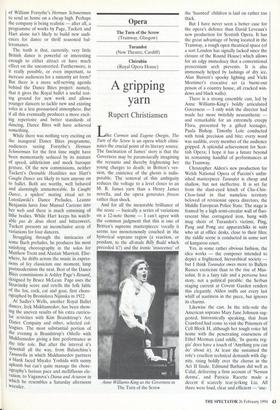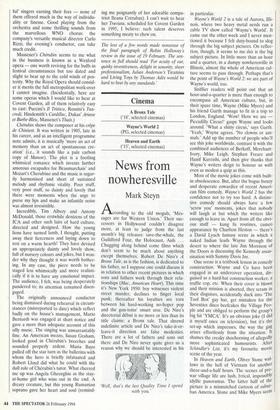Opera
The Turn of the Screw (Tramway, Glasgow) Turandot (New Theatre, Cardiff) Cherubin (Royal Opera House)
A gripping yarn
Rupert Christiansen
Like Carmen and Eugene Onegin, The Turn of the Screw is an opera which elimi- nates the crucial point of its literary source. The fascination of James' story is that the Governess may be paranoiacally imagining the scenario and thereby frightening her young charges to death; in Britten's ver- sion, the existence of the ghosts is indis- putable. The removal of this ambiguity reduces the voltage to a level closer to an M. R. James yarn than a Henry James novella, and the opera generates frisson rather than shock.
And for all the inexorable brilliance of the score — basically a series of variations on a 12-note theme — I can't agree with the common judgment that this is one of Britten's supreme masterpieces: vocally it seems too monotonously couched in the hysterical soprano region (a reaction, or pendant, to the all-male Billy Budd which preceded it?) and the ironic 'innocence' of Anne Williams-King as the Governess in The Turn of the Screw the 'haunted' children is laid on rather too thick.
But I have never seen a better case for the opera's defence than David Leveaux's new production for Scottish Opera. It has the great advantage of being located in the Tramway, a rough open theatrical space (of a sort London has signally lacked since the closure of the Round House) which allows for an edgy immediacy that a conventional proscenium arch prevents. It is also immensely helped by lashings of dry ice, Alan Burrett's spooky lighting and Vicki Mortimer's evocative set (a burnt-out prison of a country house, all cracked win- dows and black walls).
There is a strong ensemble cast, led by Anne Williams-King's boldly articulated Governess — I only wish the director had made her more twitchily neurasthenic — and remarkable for an extremely creepy Flora, presented by a gifted teenager, Paula Bishop. Timothy Lole conducted with brisk precision and bite; every word was audible, every member of the audience gripped. A splendid achievement for Scot- tish Opera; I hope it has a future beyond its remaining handful of performances at the Tramway.
Christopher Alden's new production for Welsh National Opera of Puccini's unfin- ished masterpiece Turandot is cheap and shallow, but not ineffective. It is set far from the slant-eyed kitsch of Chu-Chin- Chow-land in that nameless territory beloved of revisionist opera directors, the Middle European Police State. The stage is framed by a high semi-circular wall of fluo- rescent blue corrugated iron, hung with mug shots of Turandot's victims; Ping, Pang and Pong are apparatchiks in suits who sit at office desks, close to their files; the riddle scene is conducted in some sort of kangaroo court.
Yes, in some rather obvious fashion, the idea works — the composer intended to depict a frightened, hierarchical society — but I think Turandot owes more to Ballets Russes exoticism than to the rise of Mus- solini. It is a fairy tale and a perverse love story, not a political parable: the Serban staging current at Covent Garden renders this elegantly. Alden sniffs out every last whiff of nastiness in the piece, but ignores its charms.
Likewise the cast. In the title-role the American soprano Mary Jane Johnson sug- gested, histrionically speaking, that Joan Crawford had come to visit the Prisoners of Cell Block H, although her tough voice hit home with the penetrating coarseness of Ethel Merman (and oddly, 'In questa reg- gia' does have a touch of 'Anything you can do' about it). At least she sustained the role's cruellest technical demands with dig- nity, rising boldly over the chorus in the Act II finale. Edmund Barham did well as Calaf, delivering a firm account of `Nessun dorma', and Patricia Racette made a decent if scarcely tear-jerking Liu. All three were loud, clear and efficient — 'use- ful' singers earning their fees — none of them offered much in the way of individu- ality or finesse. Good playing from the orchestra and some thrilling sounds from the marvellous WNO chorus: the company's versatile musical director Carlo Rizzi, the evening's conductor, can take much credit.
Massenet's Cherubin seems to me what in the business is known as a Wexford opera — one worth reviving for the buffs in festival circumstances but too dated and slight to bear up to the cold winds of pos- terity. Why the Royal Opera should consid- er it merits the full metropolitan work-over I cannot imagine. (Incidentally, here are some operas which I would like to hear at Covent Garden, all of them relatively easy to cast: Puccini's 11 Trittico, Rossini's Tan- credi, Hindemith's Cardillac, Dukas' Ariane et Barbe-Bleu, Massenet's Thais.)
Cherubin shows the composer at his crepe de Chiniest. It was written in 1905, late in his career, and as an intelligent programme note admits, it is musically 'more an act of memory than an act of spontaneous cre- ation' (i.e., it sounds like a pale carbon copy of Manon). The plot is a footling whimsical romance which invents further amorous escapades for Beaumarchais' and Mozart's Cherubino and the music is sugar- ily harmonised and short of sustained melody and rhythmic vitality. Poor stuff, very poor stuff, so dainty and lovely that there were moments when the urge to purse my lips and make an infantile noise was almost irresistible.
Incredibly, Tim Albery and Antony McDonald, those erstwhile denizens of the ICA and other such lairs of hard culture, directed and designed. How the young lions have turned lamb, I thought, putting away their fierceness and laying down to rest on a warm hearth! They have devised an appropriately dainty and lovely show, full of nursery colours and jokes, but I won- der why they thought it was worth bother- ing. In any case, the piece needs to be staged less whimsically and more realisti- cally if it is to have any emotional impact. The audience, I felt, was being desperately pandered to; its attention remained disen- gaged.
The originally announced conductor being dismissed during rehearsal in circum- stances (misreported to date) which reflect badly on the house's management, Mario Bernardi was engaged at short notice and gave a more than adequate account of this silly music. The singing was unwarrantably fine. An American mezzo, Susan Graham, looked good in Cherubin's breeches and sounded properly ardent. Maria Bayo pulled off the star turn as the ballerina with whom the hero is briefly infatuated and Robert Lloyd did what he could with the dull role of Cherubin's tutor. What cheered me up was Angela Gheorghiu as the stay- at-home girl who wins out in the end. A dreary creature, but this young Rumanian soprano gave her heart and soul (remind-
ing me poignantly of her adorable compa- triot Ileana Cotrubas). I can't wait to hear her Traviata, scheduled for Covent Garden in 1995, I believe: such talent deserves something meaty to chew on.



























































 Previous page
Previous page